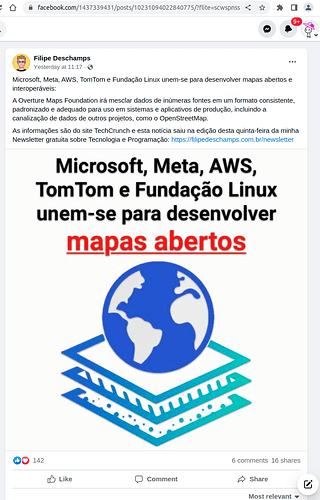As practical action: I believe we do solutions, and fast (already by 2023, their release date), to mitigate the technical gaps and put this under OSMF infra, not outside. Don’t need to be perfect, but needs to happen, even if read-only generated version from real data/metadata. Some things might be easier than others, but continuation of gap not only massively will make new volunteer collaborations outside these companies go to Overture Map Foundation (because of usability), but even part of existing collaborators directly on OpenStreetMap will move to Overture Map.
Bit more context
They do say they do not try to be a community, and are focused on production-ready data use (normalize schema, cleaning for vandalism, etc). However, while they might be perceived here as mere competition to OpenStreetMap, they seem to be advertised by news media as open data competition to Google Maps related services. I even noticed here in Brazil, notices like this one (which, by the way, are the type of tech influencer I would ask to promote OSM for developers):
Triva: "mapas apertos"@pt = "open maps"@en.
So, even if they don’t say they’re trying to be a community, the fact they will start of with small part of heavy collaborators from OpenStreetMap (the ones from roads) and have an normalized output to please developers of geo data (not just map), assuming the obvious fact that to compete with Google Maps, they would need to start collecting amenities from massive user base out there’s, then, how much collaborators they actually would have? My argument here is that the fact that “OpenStreetMap collaborators” not appear (and it was a way to advertise OSM exist) is actually less problematic than the likelihood of them making it easier to accept data directly on them. Their license already is free like OSM, and is backed by a trustworthy organization, Linux Foundation. And they are even likely to provide very well documented APIs with low fees at negative margins of profit to target Google Maps and related services (not OpenStreetMap).
I didn’t do the math, but outside Europe, the coverage of OpenStreetMap is lower, and they’re going for it. What I know is that Brazil is over 80% of the area of the entire Europe, yet data dumps are less than Germany, so while my account is new (5 October) I was already discussing here with well planned ahead, imports and synchronizations could easily get top contributions. The way this Overture Map Foundation seems to be aiming is making a similar approach, both at their working groups (data schema and conflagration), and seems to be targeting at world level. So, by inference, even with less perfect care like tooling for a country like mine, they’re in very few years will be able to not need to show “OpenStreetMap collaborators” at all in special in counties in Global South like India, but before this they’re likely to stop all together to get amenities from OSM (as the data model might shift over time).
So, without making this overlong, yes, I do believe we should make the technical gaps fast. Their “Global Entity Reference System” likely to provide at least identifiers for abstract concepts (like Wikidata Qs for an specific amenity that will not change over time), so this cannot be done without add something into data model, however other parts like normalized version would be feasible to do with existing tools without need to change the original data

